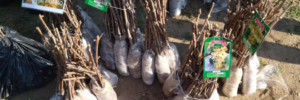Propagation materials of dubious origin were destroyed by Nébih on the Dunaföldvár market
Nébih specialists inspected the market in Dunaföldvár in May, during which they destroyed hundreds of vine and fruit planting materials that were completely unsuitable for resale, and prohibited on-site sales. The inspectors most often discovered irregularities in connection with the sale of propagating material, labeling of grape and fruit planting materials, and documents certifying the origin of propagating material.

(Photo: Nébih)
Based on a public interest report, the office learned about the illegal sale of grape and fruit propagating material taking place at the livestock and unloading fair in Dunaföldvár. During the market inspection, the experts found propagating materials of unknown origin and problematic quality. The inspectors detected irregularities in the sale of hundreds of grafts and ordered their destruction on the spot, as well as an immediate ban on the sale. In 5 cases, measures were taken because the propagating materials offered for sale did not meet even the most basic professional and legal requirements. Root-packed fruit grafts were offered for sale, which – just like free-rooted tree planting materials – cannot be marketed at all outside of the dormant period. During the inspection in May, the specialists found the grafts already sprouted, in a very weak physiological state that made their establishment and development after planting impossible, which in itself justified the ban from distribution. The most problematic batches – which were also destroyed – were of raspberry, currant and grape species. In the case of grafts, irregularities occurred in the group of apple fruits (apples, pears, quinces) and stone fruits (plums, cherries, cherries, apricots and peaches).
There were also many problems with the labeling of vine and fruit planting materials
In some cases, the label was completely missing, in other cases it was replaced with a large and colorful species picture, which was not suitable for marking and certifying the quality of the reproduction. With one exception, the inspectors could not present the documents proving the origin of the propagating materials (certificate of origin, delivery note, etc.). Thus, it can be rightly assumed, especially in the case of berry fruit propagating materials, that they were not propagated in regular fruit nurseries.
A trader who does not comply with the legal regulations when placing propagating materials on the market can expect to be fined for quality protection.
Nébih
Related news
From ham to egg dye – comprehensive Nébih inspection continues until Easter
🎧 Hallgasd a cikket: Lejátszás Szünet Folytatás Leállítás Nyelv: Auto…
Read more >AM: from ham to egg dye, comprehensive Nébih inspection is underway until Easter
🎧 Hallgasd a cikket: Lejátszás Szünet Folytatás Leállítás Nyelv: Auto…
Read more >Related news
Will AI tell us what we can buy in stores and for how much?
🎧 Hallgasd a cikket: Lejátszás Szünet Folytatás Leállítás Nyelv: Auto…
Read more >AM: focus on the role and protection of medicinal plants
🎧 Hallgasd a cikket: Lejátszás Szünet Folytatás Leállítás Nyelv: Auto…
Read more >








